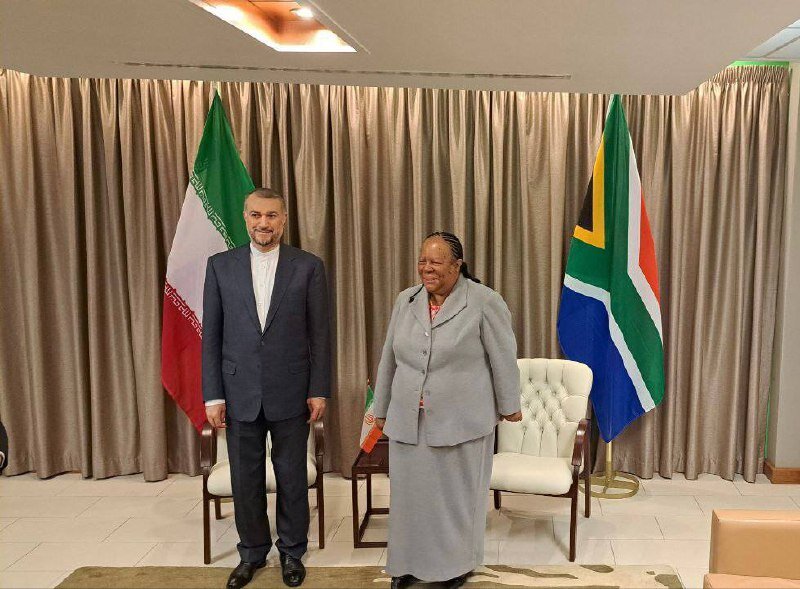South African leader says Pretoria fully backs Iran's inclusion in BRICS

TEHRAN – Iranian Foreign Minister Hossein Amir Abdollahian arrived in Tehran on Friday morning, concluding a visit to South Africa where he met the country’s high-level officials in Pretoria.
Amir Abdollahian and Naledi Pandor, the South African Minister of Cooperation and International Relations, signed a memorandum of understanding at the end of the expert panel deliberations of the Joint Economic Cooperation Commission meeting.
It followed after the regional director generals of the ministries of foreign affairs from both countries presented a report on the deliberations during the 15th meeting of the Joint Economic Commission of the Islamic Republic of Iran and the Republic of South Africa in Pretoria, according to the Iranian foreign ministry.
Amir Abdollahian met with Pandor during his initial round of negotiations with the top South African diplomat in Pretoria on Thursday afternoon.
Amir Abdollahian highlighted South Africa's significant role in the African continent and Iran's strategic position in West Asia, emphasizing the need for comprehensive political and economic cooperation between the two countries to enhance intercontinental and global interactions.
The Iranian foreign minister outlined Tehran's stance on regional and international matters, including the conflict between Russia and Ukraine, the situation in Sudan, Yemen, and Palestine. He expressed satisfaction with the alignment of views between Tehran and Pretoria on these issues and called for increased cooperation and exchange of opinions on global matters.
Amir Abdollahian refuted Western accusations regarding Iran's alleged sale of arms to Russia in its war against Ukraine, stating that Iran had not received any documents proving such a claim in a meeting between Iranian and Ukrainian military delegations in Muscat.
He proceeded to discuss the security and political circumstances in Afghanistan, expressing concern about the oppression of women in the country and the significant influx of Afghan refugees into Iran.
Amir Abdollahian attributed the current challenges of drug trafficking, insecurity, and the influx of refugees to Iran to the two decades of the U.S. occupation of Afghanistan.
The foreign minister also regarded the growing relations between Iran and Saudi Arabia as an accomplishment of the Raisi administration's neighboring policy. He expressed contentment with the agreements concerning the cessation of the war in Yemen and emphasized Tehran's support for talks between Yemeni factions.
Regarding Palestine, Amir Abdollahian expressed satisfaction with South Africa's government stance and considered the Supreme Leader's proposal for resolving the Palestinian issue through a referendum among all Palestinians as the only legitimate solution to the Palestinian crisis.
He also elaborated on Iran's cooperation with the International Atomic Energy Agency, highlighting the importance of the agency's focus on technical activities and avoiding politicking.
In the end, Amir Abdollahian pointed to Iran's strategic and geopolitical capabilities in cooperation with BRICS, while emphasizing Tehran's interest in joining the economic alliance. He urged South Africa's support for Iran's membership in BRICS.
Additionally, he regarded President Raisi’s upcoming visit to South Africa as a valuable opportunity to strengthen economic and political ties between Tehran and Pretoria.
Regarding South Africa's perspective, Pandor addressed the current political and security situation in African countries. The top South African diplomat stressed Pretoria’s support for the Palestinian people, criticizing the United Nations' double standard towards territorial integrity and the world body's disregard for the Palestinian people's choices.
Pandor emphasized the significance of the Pretoria-Tehran relationship and reiterated South Africa's backing for Iran's inclusion in BRICS.
The Iranian foreign minister also met with President Matamela Cyril of South Africa on Thursday afternoon.
He expressed satisfaction with the strong and expanding relations between the two countries and the successful outcome of the 15th meeting of the Joint Economic Cooperation Commission. He emphasized the importance of the constructive agreements reached across different sectors and the preparation of multiple cooperation documents.
Amir Abdollahian also announced Iran's acceptance of the invitation to participate in the BRICS summit. President Raisi of Iran will attend the meeting.
He highlighted Iran's vital role in West Asia and South Africa's influence in the African continent, emphasizing the potential for collaboration between Tehran and Pretoria in various fields given their capacities. The top Iranian diplomat warmly welcomed the development of cooperation between the two nations.
President Ramaphosa, in turn, conveyed his greetings to President Raisi and expressed satisfaction with his acceptance of the invitation to attend the BRICS summit and his upcoming official visit to South Africa in the fall. He described Raisi’s visit as important and stressed the significance of his Iranian counterpart's presence at the BRICS summit and South Africa's keen interest in Iran's participation in the event.
Ramaphosa noted that the BRICS summit holds significant global attention and South Africa fully supports Iran's inclusion as a friendly nation.
He stated, "We are pleased with the agreements reached at the joint commission meeting and we are ready to implement them."
Ramaphosa expressed hope that during the upcoming official visit of the Iranian president, several cooperation documents would be signed, leading to the effective implementation of bilateral cooperation agreements across various fields.
